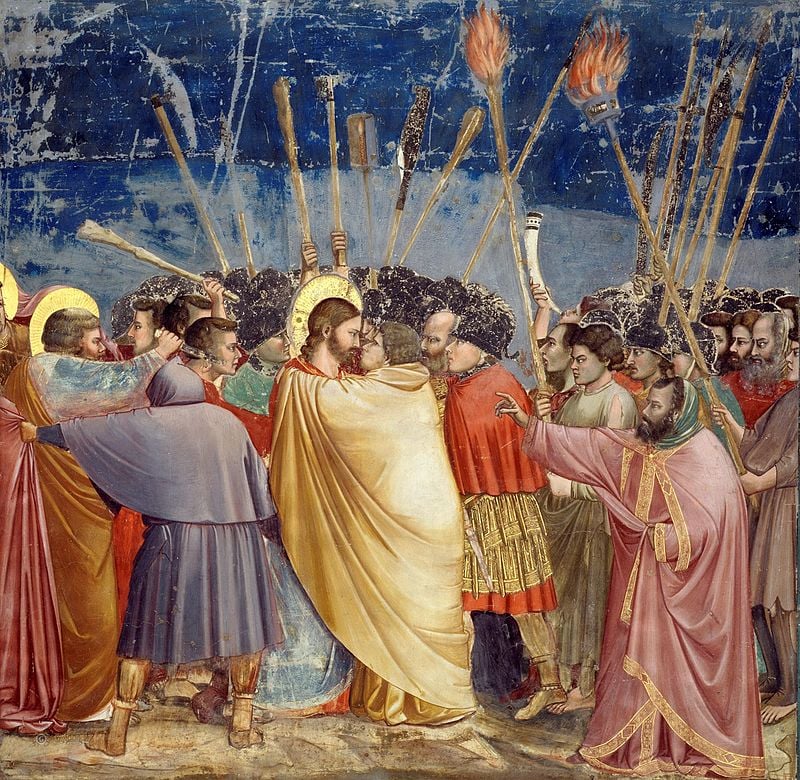David Russell Mosley

Giotto (1266–1337)
Title The Arrest of Christ (Kiss of Judas)
Description
English: No. 31 Scenes from the Life of Christ: 15.
The disciple on the left, who wounds a soldier with his knife, is Saint Peter.
Date between 1304 and 1306
(Public Domain)
Ordinary Time
14 March 2017
The Edge of Elfland
Hudson, New Hampshire
Dear Readers,
About a month ago over at the Lepanto Institute Facebook page, a meme was posted. You can see it here. It pictures an almost offensively stereotypically Jewish Judas kissing a rather European looking Jesus. At the top in ominous, red letters it says, Judas Iscariot; at the bottom (oddly in white), Patron Saint of Social Justice. Scot Eric Alt and Mary Pezzulo adequately explained and criticized this: “Lepanto Institute Meme Attempts to Link Social Justice to Judas Iscariot,” “The Lepanto Institute and the Sin of Judas,” and “Lepanto Institute Under Malicious Attack by Evil “Social Justice Warriors”!”
I thought things were done, then I cam across this piece by Steven Skojec over at 1Peter5 (an odd, to me, Catholic site). Skojec describes Pope Francis as wearing some kind of mask (as if, perhaps, he’s really just a front for a demon and the Devil/Antichrist really now is the Pope in Rome as so many of my fundamentalist, dispensationalist Protestant friends used to tell me). Skojec’s article is strange enough. But then I read the comments. Two people, in conjunction with one another, regarded Pope Francis, SJW, as Judas’ pope. One commenter went so far as to suggest there were “excellent parallels” between Pope Francis and Judas, both, the commenter notes, Social Justice Warriors.
Now, I don’t want to beat a dead horse. But let’s do be reminded of the context for this claim. While the anointing of Jesus’ feet with expensive perfume is described in three gospels, it is only in John’s that we are told it was Judas complaining. And also in John are we reminded that Judas did not actually care about the poor, but used shared purse as his personal purse, purloining coins whene’er he could. So, the context makes it clear, Judas’ goals are not social justice, but personal gain. But, what if Judas did really want to help the poor? I mean, let’s remember that two other gospels merely tell us that some of the disciples complained about the woman’s actions suggesting that they could have sold the perfume and aided the poor. On the face of it, we could easily read them as passages about “social justice.”
This is where a video from back in November featuring Dr. Conor Cunningham, of my alma mater the University of Nottingham, comes into play. The video is one in the Theology and Religious Studies’ Why Study series. The question at hand is, Why Study the Transcendentals. Throughout the video Cunningham discusses the importance of the transcendentals, primarily Beauty, Truth, and Goodness. These are considered by Thomas Aquinas as being convertible with Being. What this means is this: Everything that is, by virtue of existing, must at least insofar as it exists is also good, true, and beautiful. Central in all this is the unity of Truth, Goodness, and Beauty. They are not meant, so Cunningham reminds us, to be divided.
Throughout the video, Cunningham gives examples of what too much emphasis on one of the transcendentals, to the exclusion of the others, can look like. Goodness brought to fore can lapse into moralism; Beauty into vanity or aestheticism; Truth into propositions (or theological masturbation as Cunningham calls it). Then Cunningham does something apropos of all these Judas Iscariot, SJW memes and ideas. He uses Judas (I think, in the moment he may have forgotten John’s little explanatory note about Judas the thief) as an example of someone who focuses on Goodness to the exclusion of Beauty. Cunningham notes that there are those who question why we build cathedrals when there are poor people to feed. He reminds us that we build cathedrals (which are beautiful) because of the poor. Beauty, properly received, can lead us to Truth and Goodness. So, even if Judas had truly wanted to feed the poor, his problem would not have been a dedication to the Good, but a forgetfulness of the Beautiful (and in Judas’ case the True as well).
So where does this leave us? Is Judas the “patron saint” of social justice warriors? On the one hand, of course not. That’s ridiculous on a whole host of levels. But Christ’s words (whether to Judas or to all the disciples) still stand. We cannot become so focused on social justice that we forget the Truth or the Beautiful. No more than we ought to become so focused on the Truth so as to lose focus on the Good and the Beautiful; or on the Beautiful so as to lose focus on the Good and the Truth. The three must stand united (just as Father, Son, and Holy Spirit can never be truly divided). So we must feed the poor; we must be social justice warriors. But perhaps, to further a meme suggesting other role-playing classes, we ought also to be or to raise up social justice bards (or poets/artists) and social justice philosophers and theologians. And I don’t simply mean poets and artists who write, paint, and sculpt about explicit social justice issues; or philosophers and theologians who are exclusively ethicists. Rather I mean we must foster poets and artists and philosophers and theologians (and bankers and farmers and housewives and househusbands and students) whose lives are so organized around Truth, Beauty, and Goodness that while they may not always have the ferver of some SJWs they will nevertheless be committed to bringing about social reform just as (or perhaps slightly less than) they are committed to writing beautiful (and good and true) poetry or devising true (and good and beautiful) books about God and the nature of reality. We must be whole. We must also be the body, allowing some to be legs, others eyes, still others mouths and ears. And we must tend to each part of the body to ensure that we move with one fluid motion.
Sincerely,
David












